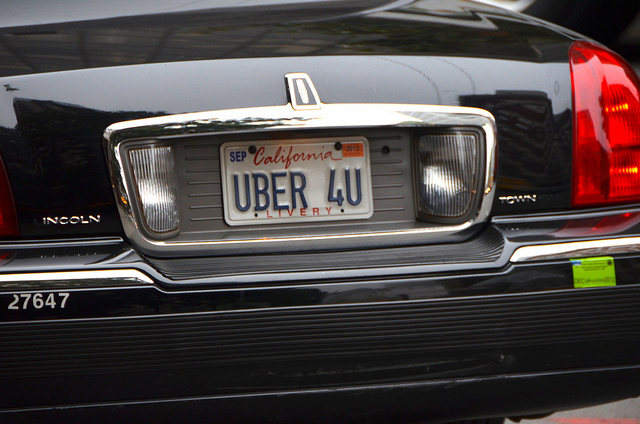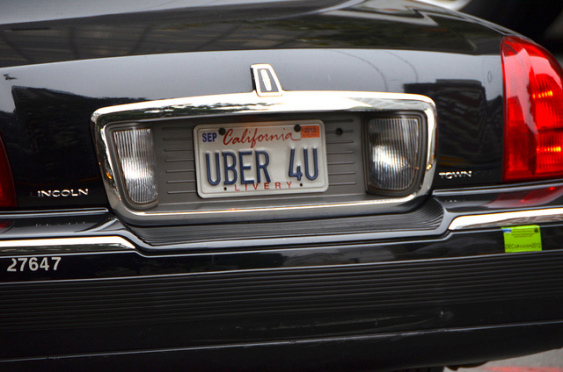Portland and Vancouver BC officials, welcome to Seattle’s pain. With Uber launching (or threatening to launch) its app-based personal transportation service in your city, you have a real puzzle to solve.
You only have to balance all these goals: Protecting consumers, supporting green alternatives to car ownership, enforcing sensible rules, jettisoning outdated ones, not rewarding bad behavior, confronting limitations of a strangled taxi system you created, navigating tough equity questions, and taking on a company now valued at $40 billion that doesn’t give an inch without a fight.
If it makes you feel any better, Seattle spent more than a year trying to figure that out. The compromise it reached earlier this year is imperfect, and the city arguably got swept up in a popularity contest in which the prom queen has now lost some of her luster.
But you can still benefit from that effort, as well as hindsight. Since Seattle passed its new rules for “transportation network companies” (TNCs) in July, Uber (or its officials) have been sued by district attorneys in California for misleading consumers about safety practices, went on a bizarre tear about smearing journalists, was banned in New Delhi after a driver raped a passenger, apologized for sexist promotions in France, launched in Portland against the city’s express will, and has fought stricter insurance requirements. This weekend, it appalled the world by initially defending a policy that charged $100 fares to leave downtown Sidney, Australia, where a hostage crisis was unfolding (though the company quickly walked that back).
All that serves to debunk the myth that this whole debate has been about the monopolistic taxi cartel trying to stymy innovation. The reality has been more complicated, given the TNCs’ unwillingness to share information and their routine objection to fairly basic safety regulation. Just because a company offers great customer service doesn’t mean that regulators charged with protecting the public aren’t entitled to scrutinize their practices. And just because they have software algorithms to weed out unsafe drivers doesn’t mean we have to take their word that they work.
At the same time, problems that seem to stem largely from Uber’s corporate culture shouldn’t taint an entire industry that is filling an important and unmet need. Lyft, for instance, also believes that many of the existing rules that govern taxis shouldn’t apply to them. And the company has fought as hard as Uber to avoid them. But it hasn’t had a fraction of the public relations problems, and, more recently, seems to be taking a softer stance towards reasonable oversight.
So, in the interest of helping other cities navigate this brave new world, here are a few observations after watching Seattle struggle to craft reasonable and equitable regulations for the new ride-for-hire upstarts:
They’re Not Going Away
Now that companies like Uber and Lyft and Sidecar have shown consumers how convenient it is to get around without a car, the ride-for-hire industry isn’t going back to the way it was. Given Uber’s deep pockets and disregard for city rules and injunction threats that would deter more compliant companies, it’s not likely to give up on promising markets.
Uber did voluntarily end its towncar service in Vancouver BC in 2012 under provincial threats. But it didn’t stay away for long and seems to be ramping up to re-enter the market there. Stay tuned to see whether the injunction that Portland filed last week successfully stops Uber from operating until city regulations are in place—last month, that approach temporarily shut the company down in Las Vegas.
But whether those particular companies last or some new idea disrupts them, the rules that have stunted and protected the taxi industry from competition are outliving their usefulness in the 21st century. Smart public officials will anticipate that change and start working towards a more open system that also offers some concessions or bridge support to taxi drivers and owners. Even smarter ones would do this on their own terms, before Uber or another company launches illegally because…
They Play in the Court of Public Opinion
In Seattle, Uber and Lyft (even with their phalanx of lobbyists and fixers) initially failed to convince the Seattle City Council to pass a regulatory bill they liked. But their secret weapon was a loyal customer base and widespread dissatisfaction with the city’s taxi service. The companies swiftly launched a well-funded referendum campaign that suspended the city new TNC rules and would have allowed voters to throw them out.
The likelihood that the TNCs would have prevailed at the ballot box (and the fact that they might operate with zero regulation in the meantime) forced everyone back to the negotiating table. But the balance of power had shifted in the TNCs’ favor. The city ultimately passed a set of regulations that was more to the TNCs’ liking, and the taxi industry was forced to make concessions that it had previously said were unacceptable.
If questions about Uber’s corporate practices and commitment to safety had surfaced before it tried to galvanize public support against the city, it might have been a different story. But maybe not—to the average person who’s just trying to get home after a night out or a bus commuter who needs to pick up a sick kid in a hurry, the TNCs still provide a seamless and fabulously efficient service.
But You Can Win Concessions
The one thing that the Seattle City Council unanimously agreed on was that the TNCs’ insurance coverage was unacceptable. They were not willing to tolerate the gaps and liabilities that surfaced after a six-year-old girl was killed by an Uber driver in San Francisco. (Uber claimed its insurance wasn’t liable because there was no passenger in the car at the time.)
Seattle insisted that the company’s umbrella policy be in effect any time a driver was active on the app. After complaining for months that the city’s stance was unreasonable, Uber unveiled a new policy that did exactly that days before before Seattle’s vote.
Seattle also requires the companies to carry liability insurance that covers up to $100,000 per person and $300,000 per accident. That’s a higher bar than most other cities have negotiated, and it’s more aggressive than the standard policy that Uber now offers in other cities. It happened largely because no one at the city level seemed willing to entertain anything different. (California recently passed slightly less aggressive insurance requirements, over the objection of its insurance commissioner who thought they should be stronger.)
In both cases, the companies fought the stricter insurance requirements until it became clear that they weren’t going to win. But as further evidence of Uber’s tenacity, Northwest regional manager Brook Steiger makes clear at the end of this interview with Bike Portland that the company is hoping to lobby in Olympia to lower its insurance standards.
Keep a Serious Focus on Safety
In Seattle, the thorniest debate revolved around whether the city should cap the number of TNC drivers as it does with taxis. That question was so contentious that other, arguably more important elements having to do with consumer protection didn’t get as much scrutiny. For instance, the final deal no longer required taxis to provide in-car security cameras, presumably because the TNCs didn’t want their drivers to have to install them. Yet that idea was never vetted in a public discussion.
Previous efforts by the state of California to regulate TNCs for health and safety largely left driver background checks and vehicle inspections up to the companies themselves. Yet a lawsuit filed last week by district attorneys in Los Angeles and San Francisco now alleges that the companies have made “untrue or misleading representations regarding the measures it takes to ensure customer safety in order to induce people to get into a stranger’s car,” primarily around the thoroughness of its background checks. The TNCs don’t necessarily fingerprint drivers to make sure they’re who they say they are, the suit alleges. It shouldn’t have taken the state a year to figure that out.
When I asked a high-ranking Lyft official early on about safety questions, the answer I got was essentially this: “We have proprietary algorithms that you couldn’t possibly understand that are far more protective than anything an antiquated city regulator could dream up. So you should just trust us on that.” But city or state officials shouldn’t have to take a company’s word about something as important as how it protects the public, and they should demand enough answers to determine whether they agree.
The Equity Issues Are Tough
It’s extremely difficult to justify rewriting the rules for well-capitalized companies who come in and break the law when an existing industry—one that’s largely made up of immigrants and people of color—has played by those overly restrictive rules for years. Yet that’s essentially what Seattle did.
In announcing the final negotiated deal, there was little mention of questions around equity, fairness, and race that informed the year-long discussion in city council chambers. Yes, taxi and for-hire drivers won some concessions and agreed to the compromise. But under the threat of a public vote—from people who aren’t really required to consider questions of fairness and only remember the times their taxi never showed up—those public policy questions matter less.
In truth, Seattle never really figured out what to do about taxi owners and drivers who made choices based on the presumption that the old, highly-regulated vehicle-for-hire system that the city had long clung to would continue. The city council’s best attempt—to create a bridge system where numbers of TNC drivers would be temporarily capped while the existing for-hire industry had time to catch up—was clunky. And, ultimately, too unpopular to stand.
Hopefully, that’s an area where another city can do better. Portland and Vancouver BC, this is your chance.









Michael Alexander
Thanks for the usual thorough Sightline analysis. However I take issue with one important statement:
“It’s extremely difficult to justify rewriting the rules for well-capitalized companies who come in and break the law when an existing industry—one that’s largely made up of immigrants and people of color—has played by those overly restrictive rules for years.”
True on its face, but very misleading.
Those “immigrants and people of color” are taxi drivers. They are largely independent contractors who rent from their owner a vehicle and the medallion that lets them solicit business. Typically, that is the owner. of a fleet of cabs, ranging from a few to hundreds The driver’s rent (often called the gate) is paid up front, so the driver only pockets money after he’s collected the gate for the owner.
Furthermore, if the passenger pays by credit card, the driver gets nicked 5% for the privilege– and drivers in San Francisco, pre-Lyft, told me the medallion owners took another 5%. Including on the tip.
The real value here is the medallion, because the city monopoly limits the number available. So the medallions trade in a free market and in cities like New York or San Francisco sell for upwards of $1,000,000. What drivers can front that money, or qualify for a bank loan?
Who has the primary interest in maintaining this monopoly? To find that answer, use the Watergate rule: ‘Follow the money, follow the money, follow the money.” (For those too young, stream ‘All the President’s Men’, 1976). So who donates to municipal politicians? Medallion owners, not drivers.
I have no love for Uber’s business practices or philosophy, (Lyft, in my experience, is better.) but the disruptors are blowing up cozy arrangements that dis-services the drivers and the public.
In my last trips to San Francisco, I made two observations that I’ve not seen reported in this story or others:
* Taxi fleets can’t find drivers for their cabs, as drivers have fled to the disruptors. So the value of medallions has plunged.
* I would normally have used a taxi once, maybe twice. I used Lyft eight times. Who’s analyzing whether the disruptors are growing the market?